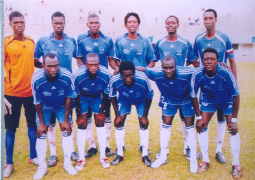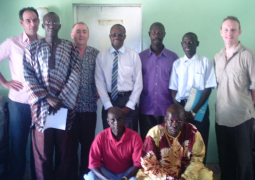The ECOWAS gender development center in collaboration with the Women's Bureau conducted a one day validation workshop of the study on ECOWAS Trade Liberalization Scheme and Cross-border Trade shared experiences of women traders and entrepreneurs on Wednesday the 18th of March 2009 at the Paradise Suites Hotel. Madam Aminata Dibba the Director of the ECOWAS Gender Development Center (EGDC) revealed that the EGDC was established following a decision taken by the Authority of Heads of States and Governments in 2003. The Gender center is a specialized agency of ECOWAS, which serves as a technical organ to generate requisite knowledge and transfer of skills in gender mainstreaming. The study, which was validated at the meeting, is therefore in line with the Gender Centres goal, which consists of closing the existing gender gaps and eliminating discrimination in development and improving the social, economic, legal and cultural conditions of women in the sub-region.
She further revealed that under the article 63 of Revised Treaty, pertaining to women and development, the 15 member states of ECOWAS are required to formulate, harmonize and establish appropriate policies and mechanisms for the enhancement of women's economic, socio-cultural conditions and status.
ECOWAS is thus conscious of the importance of women's economic empowerment as a key to development and regional cooperation. Thus, the need to take the gender factor into consideration if the West African sub region is to be transformed into a haven of peace, progress and stability in pursuit of the goals of regional integration and cooperation.
Further and most importantly, following the launching of the ETLS in 1990 with a view to eliminating all tariff barriers on goods and products originating from Member- States, there are still constraints, particularly in respect of free movement of goods. Unfortunately, these constraints are even more pronounced with regard to the cross-border trade activities involving women traders and entrepreneurs. Yet, we are all aware of the important role these women traders and entrepreneurs play in the regional integration process in terms of revitalizing sub-regional cooperation and strengthening ECOWAS capacity to integration into the global market. Yet still, these women are subjected to all kinds of harassment when conducting their activities. Other women traders from Guinea Bissau, Mali and Senegal vented out their spleen on the misunderstandings they usually experience at these cross-borders when they want to cross their merchandises.
This is the second phase of the study of cross-border trade, carried out by the EGDC, and it covers four ECOWAS member states, namely Gambia, Guinea Bissau, Senegal and Mali. The first phase covered four other member states namely; Benin, Togo, Nigeria and Ghana. Research has shown that one of the major challenges facing the fight for gender equality and women's empowerment, in most parts of the world is the lack of reliable information, and gender disaggregated data, to support advocacy initiatives, and policy formulation processes. In the ECOWAS region, the lack of adequate gender disaggregated data, has hampered efforts, to develop concrete arguments, that will inform policy frameworks, for the promotion of gender equity and equality. This has also made it quite difficult, to embark on program initiatives, that adequately address the practical and strategic gender needs of women.
The Vice President Ajaratou Isatou Njie Saidy said, "it is therefore, with a sense of pride, that I commend the EGDC for this research effort, that will contribute significantly to the body of knowledge and literature on gender and development in the ECOWAS region."
Mrs. Adelaide Sosseh read read out the objectives of the validation workshop and they are:
1. To provide a platform for the target groups of the study to examine and validate the interim report of the study.
2.To make recommendations on the way forward in the view of strengthening the implementation of the policy.
3. To provide ECOWAS trade liberalization scheme ownership of the entire process of the study.
4. To Provide an instrument for influencing policies on the involvement of women traders and entrepreneurs in cross-border trade activities.
The core of the integration process, within ECOWAS, has been the promotion of regional trade, through market and monetary integration, and very close political cooperation, characterized by the free movement of goods and services, persons as well as capital. As part of this process, the ECOWAS trade liberalization scheme was launched in 1990, with the view to facilitate intra-community trade, through the creation of a free trade area (FTA) underscored, by the elimination of all forms of tariff and non-tariff barriers, on goods, originating from member-states. One of the obstacles that was figured out was that ECOWAS is more inclined to deal with political issues rather than concentrate on economic integration. The recommendations they also came out with are;
1. Dessimmination of information
2. To enhance the means of women so as to enable them play their role in cross-border trade.
3. To develop communication infrastructure so as to know market system.
Some of the constraints faced by women traders along these cross-border trades are;
1.Lack of capacity in the women traders.
2.Lack of security along these cross-borders.
Lack of inappropriate trade policies.
Read Other Articles In Article (Archive)



